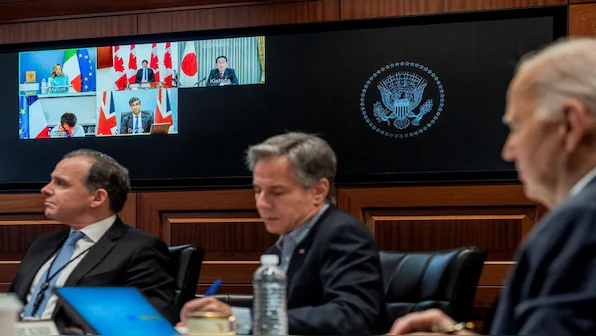Iran attacks Israel: Tehran could not afford a paper tiger image, but international community must stop escalation
- May 21, 2024
- Posted by: admin
- Categories: Iran, Israel

Anil Trigunayat
Israel is quite stretched, and opening new fronts would further compromise its security, whatever the dictates of bravado and political expediency
Finally, after Eid El Fitr and the holy month of Ramadan, as expected, Iran reacted and retaliated against the Israeli strikes on its consulate in Damascus, which killed seven people, including the Generals of its elite forces, the IRGC. It was expected because of the historic mutually destructive syndrome between the two ‘I’s of the Middle East.
Until now, it has been devious and destructive, but either through proxies or through clandestine operations, killing high-profile personnel, especially Iranian nuclear scientists, has been well documented. But an attack on the Iranian consulate was considered a violation of sovereignty and a violation of the Vienna Convention. Hence, the Iranians invoked Article 51 of the UN Charter to justify retaliation as self defence.Advertisement
Despite economic difficulties and domestic discontent, the Iranian leadership had to respond to prove to the Iranians that the regime is capable of defending the Islamic Republic. Besides, it does not wish to be seen as a paper tiger in the region where it claims a leadership role.
However, the limited response on Israeli military targets, which, as per reports, has not damaged the targets in a great deal or killed any civilians, was termed a warning for any further direct misadventure by the Israeli leadership.
It was similar to the Iranian response against the US killing of General Qassem Soleimani. But if it is taken to another level, then the much-feared broader escalation will be difficult to contain.You May LikePeople thought hearing aids were expensive till they saw this. Read moreHear.com by Taboola Sponsored Links
The US also acts as a deterrent and a defender of Israel, irrespective of the fact that they disagree with Netanyahu and his continued excesses and utter defiance in Gaza. They moved their naval assets quickly and claimed to have assisted in deflecting the Iranian counterattacks on Israel.
Tehran had asked the Americans to stay out of it through Oman, which Washington obviously declined and warned against such response as it is not interested in the expansion of the conflict.
Israel also understood and was prepared for the Iranian response, even as it saw the repercussions of the Iranian consulate attack. But a swarm of Iranian drones flying nearly 1,500 km were easily identifiable, and many may have been shot down, but the warning and message were conveyed.Advertisement
Now, whether Netanyahu uses this controlled response to take it to the next level will determine the future course. Bibi spoke to Biden to discuss the situation and ask for more aid and urgent supplies, but whether Biden would prevail to contain the fallout is also an open question.
As such, Israel is quite stretched, and opening new fronts would further compromise its security, whatever the dictates of bravado and political expediency. Bibi claimed that ‘We will hurt those who hurt us‘ might be a prelude to his intent.
Iran has planned its strategy through powerful proxies and militias next door to Israel, including Hamas in Gaza, powerful Hezbollah in Lebanon and Syria, and determined Houthis in Yemen and the Red Sea, which have as such been engaged at different levels of intensity against Israel.Advertisement
A coordinated response of these three ‘H’s, Kataib Hezbollah, and other Shia militias in Iraq against Israel would be most dangerous for global security and supply lines.
Meanwhile, several regional countries, including Jordan, Egypt, and Iraq, have closed their airspaces, in a way distancing themselves from the war between the two rabid rivals, who have different, vertically opposite interests.
As of now, India, Russia, and China, which have good relations and heavy stakes in the region, have called for restraint by both sides so that the war does not escalate further, even as a vicious cycle of limited or broader and deeper retaliation is likely to continue. But this can spiral out of control in no time, which most countries want to diffuse.Advertisement
West Asia is India’s extended neighbourhood and has high stakes in the region’s stability and security. The biggest concern is the threat of disruption of energy and other supplies, trading routes, and most immediately, the welfare and safety of over 9.5 million Indians living and working mostly in the Gulf who may be caught in the crossfire of stupidity.
Many of the economic and connectivity projects will come under stress. New Delhi has excellent relations with all countries in the region, including Tehran and Tel Aviv.
Expressing its concern, it has urged both sides to exercise restraint, step back from violence, diffuse and de-escalate the situation, and return to diplomacy while working to secure the interests of the Indian community.Advertisement
The situation is in flux and replete with dilemmas of destruction, but hopefully the international community, especially the US, will at least try to stop the spiral of violence and escalation.
The writer is a former Indian Ambassador to Jordan, Libya and Malta and is a Distinguished Fellow with leading think tank Vivekananda International Foundation. Views expressed in the above piece are personal and solely those of the author.
